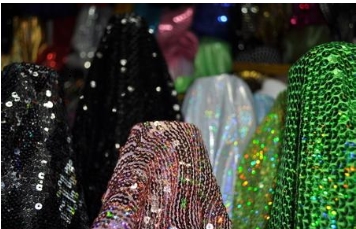 A few days ago, Peruvian textile companies and businesses mobilized the masses to the streets and demanded that the government increase the import tariffs on Chinese textiles, because in this way, Chinese textiles and Peruvian textiles could compete at the same price level. Argentina’s “Israeli†recently reported that textile merchants in Peru have closed their stores and rushed to the streets to “unfair†competition brought about by cheap Chinese clothing. The ranks of these merchants marched in front of the president’s office.
A few days ago, Peruvian textile companies and businesses mobilized the masses to the streets and demanded that the government increase the import tariffs on Chinese textiles, because in this way, Chinese textiles and Peruvian textiles could compete at the same price level. Argentina’s “Israeli†recently reported that textile merchants in Peru have closed their stores and rushed to the streets to “unfair†competition brought about by cheap Chinese clothing. The ranks of these merchants marched in front of the president’s office. Textiles merchants stated that the current government policy allows Chinese clothing to enter the Peruvian market at extremely low prices, leading to unfair competition.
Arturo Zavala, one of the representatives of textiles, said that as China’s cheap clothes surged into the market, textile sales in Peru’s local shopping malls fell sharply. He said: "Chinese clothing has occupied 80% of the market."
The government requires Peruvian domestic textile manufacturers to pay high taxes in accordance with their tax laws, but Chinese imports can enjoy different taxes and go straight.
He proposed that the government should levy a 10% tariff on imported garments and that the price per kilogram should be raised to more than 15 US dollars. He said that in this case, the prices of imported clothing and local clothing can be equal.
Arturo Zavala also called for a dialogue with the Ministry of Labor: “Our factory now has overcapacity, which exceeds 40%, resulting in more than 9,000 workers losing their jobs.â€
Between 2005 and 2012, more than 94,000 workers lost their jobs due to the closure of more than 14,000 textile factories.
Diógenes Alva, a business person who participated in the parade, said: "We are very angry about this situation. We have not asked the government for money, but we have been asking for equal legal treatment and a fair competitive environment."
According to the Textile Entrepreneurs Association, José Luis Muñoz, “In 2013, we lost $70 million. In recent years, Peruvian farmers have stopped planting 200,000 hectares of cotton due to the influx of Chinese clothing.â€
Hugo.com has learned that in the past decade, the volume of trade and investment between China and Latin America has grown rapidly, with Sino-Latin American trade exceeding US$250 billion. A report disclosed that since 2005, China has provided more than 86 billion U.S. dollars to Latin American countries.
China's trade and investment promote economic growth in Latin America, while Latin America has acquired sources other than the United States and the European Union.
With extremely close economic, trade, and investment relations, the Latin American government has adopted more liberal controls and preferential policies on Chinese imports, but the influx of Chinese products has caused dissatisfaction among local industry professionals. Over the years, China has become a veritable "world factory." Although raw material and wage levels have risen in recent years, the prices of Chinese goods in the international market are still relatively low, and therefore have a good price competitiveness.
The boycott of the textile industry in Peru reminds us of the boycott of Chinese goods in France and Spain in the early years. This should arouse the alertness of Chinese exporters. We should take early preventive measures in international trade to avoid Necessary loss.
Why do these boycott incidents happen? Apart from the fact that Chinese goods are cheap and cause local industries to be excluded, there is also an important reason for the quality of Chinese products. For example, after the Chinese dumplings exported to Japan were eaten by consumers in previous years, There have been symptoms of poisoning, so Japan launched a campaign to boycott Chinese goods; in addition, Chinese furniture exported to France was found to contain dimethylformamide, France announced a ban on imports of some Chinese furniture; China's exports to the United States from aquatic products To toys and toothpaste have been found to be inconsistent with the trademark, unsafe or contain dangerous contaminants, which are contaminating the "Made in China" brand and have caused a boycott in the United States.
Looking at all sorts of things, Hugo.com Xiaobian believes that in addition to the low prices, the Chinese goods are facing resistance. Because of quality problems, Chinese manufacturers should focus on long-term interests, increase their efforts to improve product quality, and shape their brand image. China's export road went further.
Halloween holiday is funny and mysterious ,find Halloween decorations for your party or yard. Shop for scary outdoor decorations, kid-friendly decorations, and complete Halloween Party Supplies.
Visit our online store, you find the halloween party supplies and decorations, halloween banner,halloween gift bag,halloween craft and gift, we also provide exclusive design for all customer.
Halloween decor at our online store, find everything you need at low prices to create your own haunted house!
We very happy to build a partnership relations with good buyers, welcome to contact us.

Halloween Decoration,Halloween Skeleton,Halloween Costume,Halloween Props,Halloween Bunting
Shangyi Home Products Co., Ltd. , https://www.shangyi-group.com